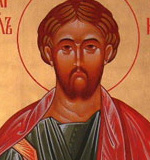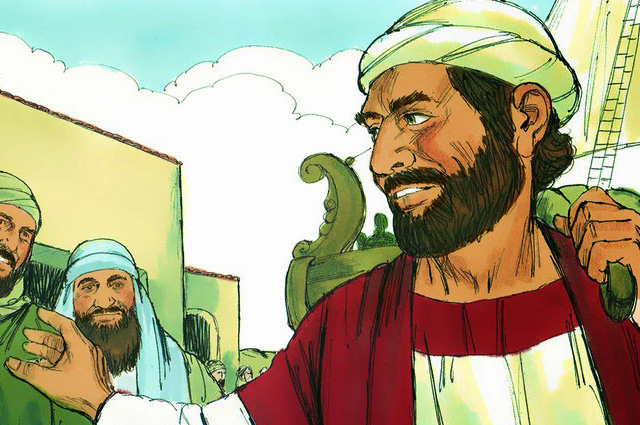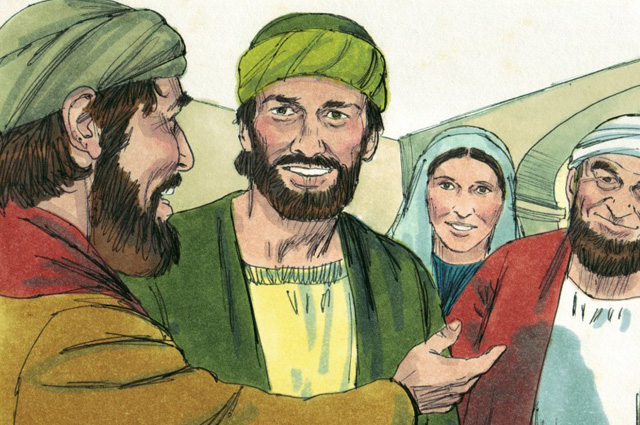Saint of the Day Online - St. Barnabas
Saint of the Day for Sunday, June 11, 2017
11-06-2017
Saint Name: St Barnabas
Place: Cyprus, Israel
Birth: XXX
Death: Reputedly AD 61
St Barnabas was an early disciple in the New Testament church. He was a Levite from Cyprus, an island in the Mediterranean Sea, about 60 miles off the coast of Israel. Barnabas later visited the island of Cyprus on the first missionary journey with the Apostle Paul, and again on a second journey with Mark.
Barnabas possessed exceptional spiritual qualities. He had an unshakable confidence in God. The lesson from various parts of the Book of Acts will focus on some of the key activities in the life and experience of Barnabas.
1) Barnabas: a generous giver (Acts 4:36-37)
2) Barnabas: a faithful friend (Acts 9:26-27)
3) Barnabas: a committed encourager (Acts 11:22-26)
4) Barnabas: a forgiving brother (Acts 15:36-41)


Soon after returning from Jerusalem to Antioch, Paul was formally invested with his new commission. His fellow-deputy, Barnabas, was appointed, as his coadjutor, in this important service. "Now," says the evangelist, "there were in the church that was at Antioch certain prophets and teachers, as Barnabas, and Simeon that was called Niger, and Lucius of Cyrene, and Manaen, which had been brought up with Herod the tetrarch, and Saul. As they ministered to the Lord and fasted, the Holy Ghost said -- Separate me Barnabas and Saul for the work whereunto I have called them. And when they had fasted, and prayed, and laid their hands on them, they sent them away."
Ten years had now elapsed since the conversion of Paul; and during the greater part of this period, he had been busily engaged in the dissemination of the gospel. In the days of his Judaism the learned Pharisee had, no doubt, been accustomed to act as a teacher in the synagogues, and, when he became obedient to the faith, he was permitted, as a matter of course, to expound his new theology in the Christian assemblies. Barnabas, his companion, was a Levite; and as his tribe was specially charged with the duty of public instruction, he too had probably been a preacher before his conversion. Both these men had been called of God to labor as evangelists, and the Head of the Church had already abundantly honored their ministrations, but hitherto neither of them seems to have been clothed with pastoral authority by any regular ordination. Their constant presence in Antioch was now no longer necessary so that they were thus left at liberty to prosecute their missionary operations in the great field of heathendom; and at this juncture, it was deemed necessary to designate them, in due form, to their "ministry and apostleship." "The Holy Ghost said -- Separate me Barnabas and Saul for the work whereunto I have called them." When we consider the present circumstances of these two brethren, we may see, not only why these instructions were given, but also why their observance has been so distinctly registered.
After being taken as pagan gods, they were stoned out of the city and fled back to Antioch in Syria. When a dispute arose regarding the observance of the Jewish laws and customs, Paul and Barnabas returned to Jerusalem for the council that decided that non-Jews would not have to be circumcised to be baptized.
When they returned to Antioch, Barnabas wanted Paul and John Mark to continue their travels with him, but Paul fell out with John Mark--perhaps because John Mark had abandoned them at Perga. In spite of Paul's extremely forceful character, Barnabas took Mark's side, demonstrating that he was a man of considerable determination and courage. The Acts of the Apostles says, "There arose a sharp contention between them. Barnabas took Mark with him and sailed away to Cyprus" (Acts 15:39). Paul chose a new ally, Silas, and went elsewhere to strengthen the churches. Little more is heard of Barnabas though it is believed that the rift with Paul was healed because we read about Barnabas later in 1 Corinthians 9:6). (Paul also discusses his relationship to Barnabas in his letter to the Galatians.)
Tradition says that Barnabas preached in Alexandria and Rome, and was stoned to death at Salamis about 61 AD. He is considered the founder of the Cypriot Church.